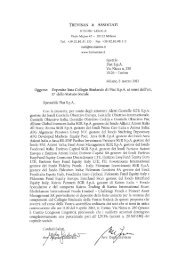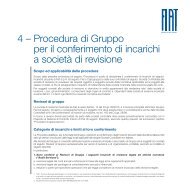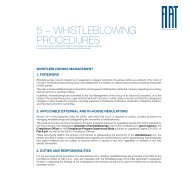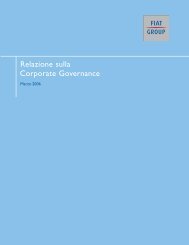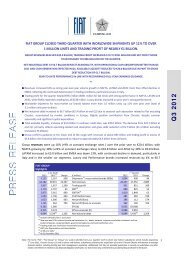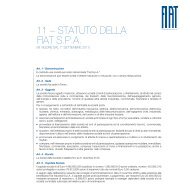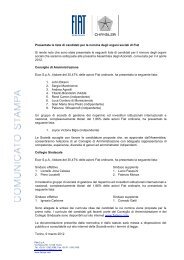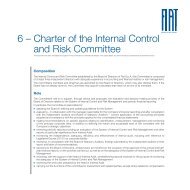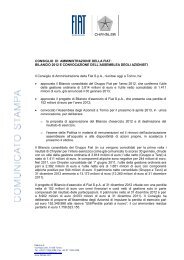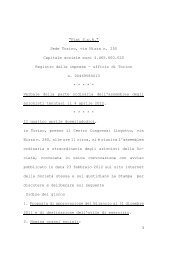annual report - FIAT SpA
annual report - FIAT SpA
annual report - FIAT SpA
Create successful ePaper yourself
Turn your PDF publications into a flip-book with our unique Google optimized e-Paper software.
the Company's purpose and not reserved by law for, or otherwise delegated or assumed by, the Board of Directors<br />
itself. In practice, the Chairman has the role of coordination and strategic direction for the activities of the Board of<br />
Directors, while the Chief Executive Officer is responsible for the operational management of the Group. From an<br />
operational perspective, the Chief Executive is supported by the Group Executive Council (GEC), a decision-making<br />
body led by the Chief Executive and composed of the heads of the operating sectors and certain central functions.<br />
In accordance with Consob Regulation 17221 of 12 March 2010, the Company has adopted, effective 1 January 2011,<br />
"Procedures for Transactions with Related Parties" (the "Procedures") to ensure full transparency and substantial<br />
and procedural fairness in transactions with related parties, as defined under IAS 24.<br />
The Procedures define "significant transactions" that require the prior approval of the Board, subject to the binding<br />
opinion of the Internal Control Committee (which serves as the committee responsible for related-party transactions,<br />
except for matters relating to remuneration, for which the Compensation Committee is responsible), and that must be<br />
publicly disclosed in the form of an information document.<br />
Other transactions, except those falling within the residual category of minor transactions – i.e., transactions less than<br />
€200,000 in value or, for transactions with legal entities having consolidated <strong>annual</strong> revenues in excess of €200 million<br />
only, transactions less than €10 million in value – are defined as "non-significant" and may be entered into with the<br />
prior non-binding opinion of the abovementioned committee.<br />
The Procedures also establish exemptions, including transactions taking place in the ordinary course of business and<br />
entered into at standard or market terms, and transactions with or between subsidiaries and associates, provided that<br />
no other parties related to the Company have a significant interest.<br />
The task of implementing the Procedures and disseminating them to Group companies is assigned to the managers<br />
responsible for the Company's financial <strong>report</strong>ing, who must also ensure coordination with the administrative and<br />
accounting procedures required under Article 154-bis of Legislative Decree 58/98.<br />
With regard to significant transactions, the "Guidelines for Significant Transactions and Transactions with Related<br />
Parties" shall also continue to apply (subsequently renamed “Guidelines for Significant Transactions”), under which<br />
transactions having a significant impact on the Company’s earnings and financial position are subject to the prior<br />
examination and approval of the Board.<br />
As such, the powers conferred on executive directors specifically exclude decisions relating to significant transactions<br />
that, in and of themselves, the company is required to disclose to the market in accordance with specific rules<br />
established by regulatory authorities.<br />
When the Company has the need to undertake a significant transaction, the executive directors are to provide the<br />
Board of Directors with a summary analysis of the strategic compatibility, economic feasibility and expected return for<br />
the Company a reasonable time in advance.<br />
Pursuant to Article 12 of the By-laws, after an opinion has been expressed by the Board of Statutory Auditors, the<br />
Board of Directors shall appoint the executive officer responsible for the Company’s financial <strong>report</strong>ing. The<br />
Board may vest more than one individual with the relevant functions provided that those individuals perform such<br />
functions jointly and with joint responsibility. Only individuals who have acquired several years of experience in the<br />
accounting and financial affairs of large companies may be appointed. In execution of this provision of the By-laws, the<br />
Board of Directors appointed the heads of the Group Control and Treasury and Financial Services functions as jointly<br />
responsible for preparing the Company’s financial <strong>report</strong>ing, vesting them with the relevant powers.<br />
At 31 December 2010, the Board of Directors was composed of three executive directors and twelve non-executive<br />
directors, who have not been delegated specific authorities or executive responsibilities at the Company or the Group,<br />
eight of whom (representing a majority) qualified as independent on the basis of the criteria approved by Shareholders<br />
on 27 March 2009, which were equivalent to those adopted previously. As required by law and the By-laws, two of the<br />
directors (Gian Maria Gros-Pietro and Mario Zibetti) also meet the requirements of independence as stipulated in<br />
Legislative Decree 58/98.<br />
The Chairman and Chief Executive Officer are executive directors. They also hold executive responsibilities at<br />
subsidiary companies: John Elkann is Chairman of Itedi S.p.A. and Sergio Marchionne, in addition to being Chairman<br />
of the principal subsidiaries, is also Chief Executive Officer of Fiat Group Automobiles S.p.A. Luca Cordero di<br />
Montezemolo also qualifies as an executive director by virtue of his position as Chairman of Ferrari S.p.A.<br />
An adequate number of independent directors is essential to protect the interests of shareholders, particularly minority<br />
shareholders, and third parties. For this reason, and believing it to be significantly in the Company’s interests to<br />
maintain a high level of guarantees and protection against potential conflicts of interest, the Board of Directors<br />
proposed that for the elections held on 27 March 2009, Shareholders elect - in addition to the two independent<br />
directors required by law - an appropriate number of independent directors and confirm the criteria for determining<br />
independence adopted for previous elections.<br />
The independence of directors is assessed <strong>annual</strong>ly and is based on the absence or non-relevance, during the<br />
previous three years, of economic or shareholding relationships or other relationships, whether direct, indirect or on<br />
Report on Operations Corporate Governance 61



